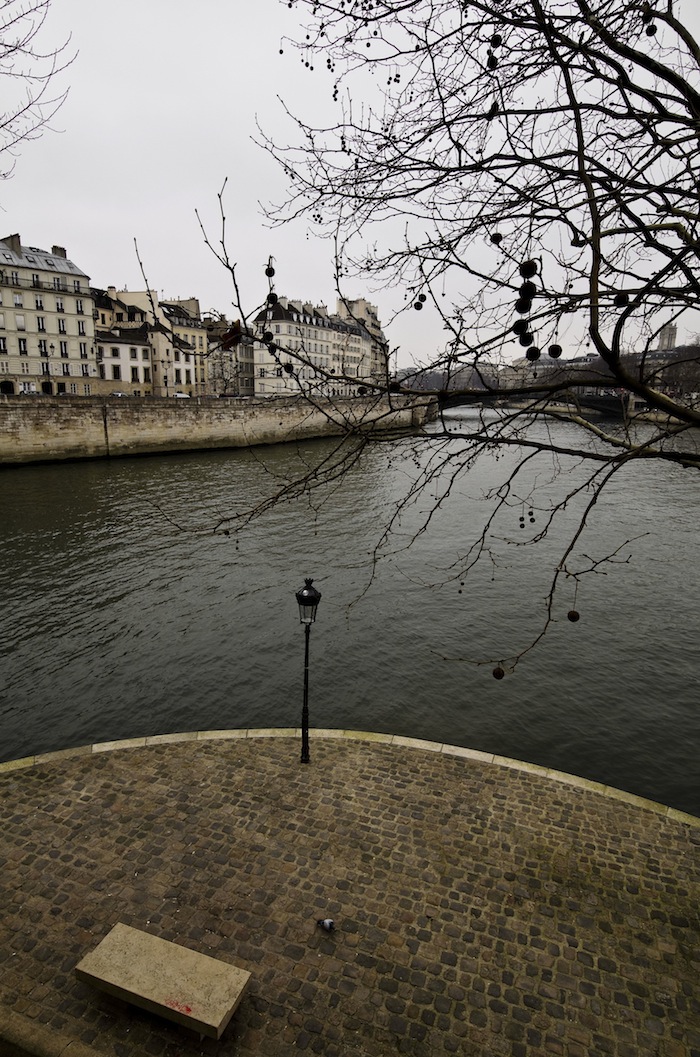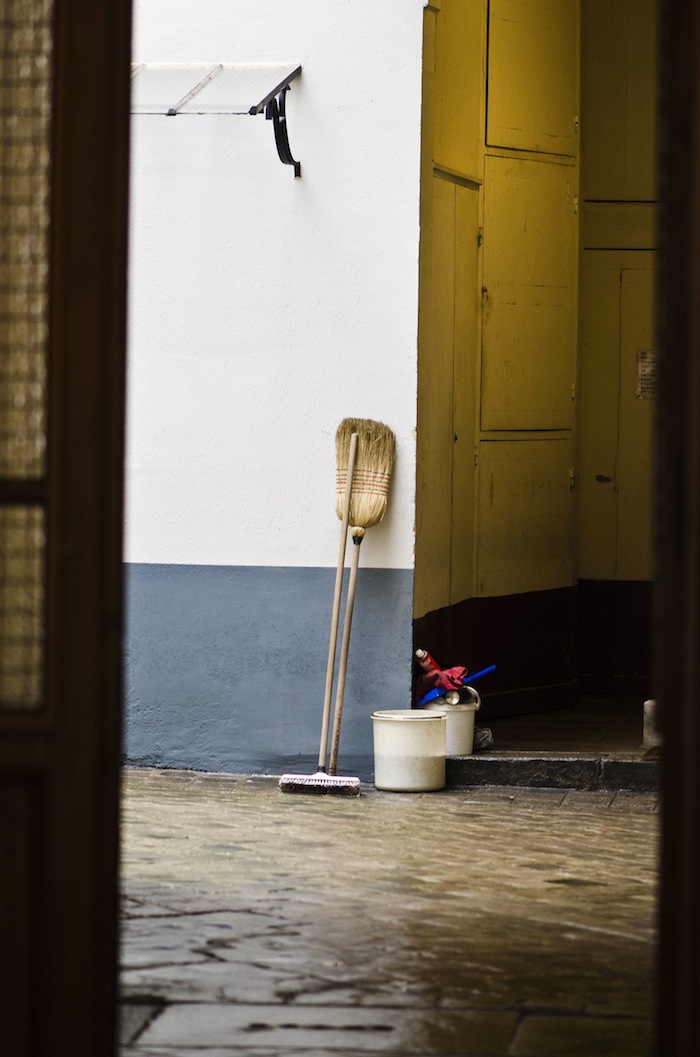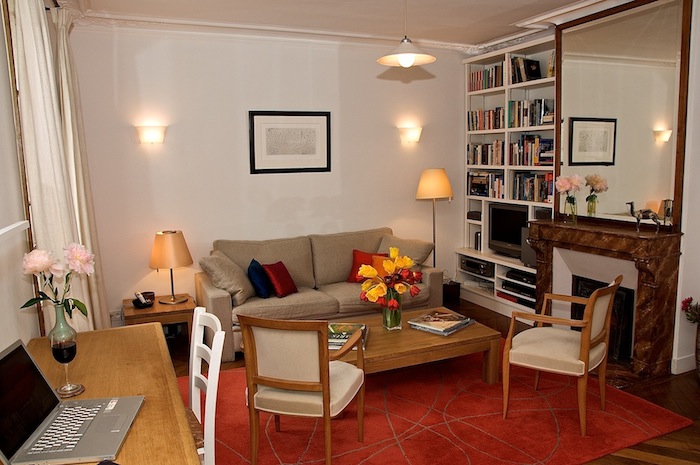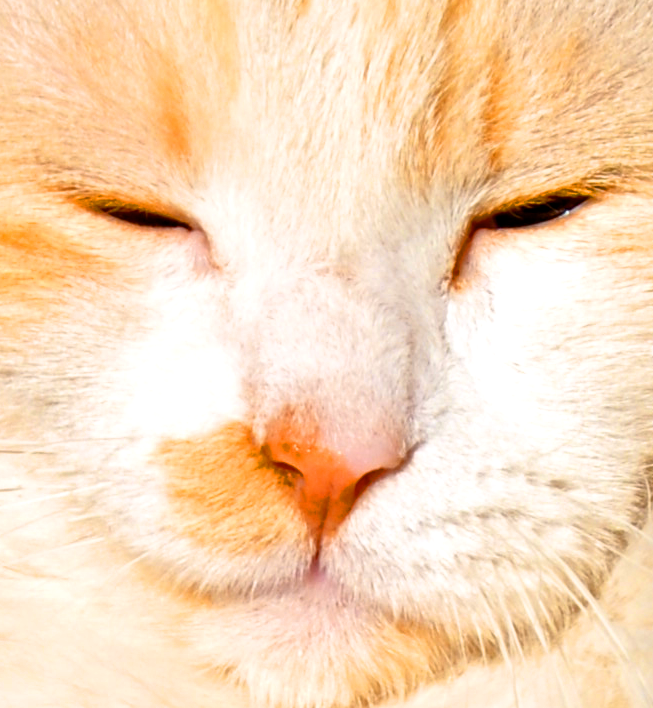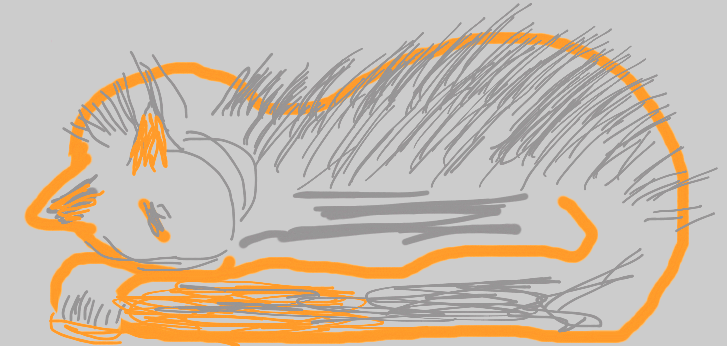
A Story in Forty Stanzas
1. C’est l’aube, dawn in Paris.
We have our Immigration appointment.
From our corner, the metal eyes of L’Institute du Monde Arabe[1],
that close on shadow, open to light,
are watching us, and we are watching them.
2. All across North Africa,
people are throwing off chains,
emerging from the shadows.
Across the Pont de Sully, light
is rising in the east. Light is rising in us.
3. Wide Boulevard Henri IV to the Place Bastille. The gold Génie
de la Liberté[2] balances on a golden globe atop a green column.
He’s a naked winged figure, a star on his forehead,
in one hand, the torch of civilization,
in the other, broken chains.

4. A black couple with two children block the sidewalk.
Unhappiness between the parents, misery in the kids.
The father walks far ahead with one child.
The mother struggles to control a younger child
crying behind her. We hurry by.
5. At Immigration, already a long line,
like the visa line outside the L.A. French Consulate
where we waited in the rain.
Wouldn’t it be more respectful to let people wait inside?
The black family gets in line behind us, the father stands separate.
6. The doors of Immigration open.
They weren’t keeping us outside—
they were closed and we were early.
We’re ushered in, passports checked,
shown upstairs, papers examined, told to sit down.
7. The father can’t get change
from the soft drink machine.
The mother sits behind us,
trying to comfort her child so half-heartedly
that the child’s crying increases.
8. They call out my name: “Kaaren Beban.”
A woman leads me to the waiting room, two rows of plastic chairs
back to back, facing doors to examination rooms.
Richard joins me: “Do they have your name wrong?”
“I wondered the same thing.”
9. We ask a woman at the information booth.
“In France a woman takes her husband’s surname.”
“But my surname isn’t Beban,” I say.
“I’m a feminist,” my husband says lightly, in his rudimentary French,
“and I object.” The woman smiles. Ah, ces Américains fous[3]!
10. Everyone around us is quiet. Too much at stake
to attract attention. A big African man comes in,
asks a question in a baritone with an undertone, Do not dream
of treating me with anything less than respect.
And who would dare? And why should they?
11. Names are called. Doctors open the exam room
and usher people in, only partially closing the door.
A medical exam as entertainment?
Richard and I joke, Let’s just poke our heads in
and ask if we can watch.
12. It’s my turn. The doctor is tall and ruddy, looks English
more than French. A merry air, as if he’s playing
a favorite game, Red Rover. He invites me
onto the scale with a flourish, then measures my height.
He shows me the eye chart, asks me to read the bottom line.
13. With my glasses on, I can’t see a thing.
I take them off and can easily read every line.
"My eyesight’s improved,” I say.
A smaller red-haired female doctor comes dancing up
and we banter in French.
14. The male doctor asks me to hold out my finger.
He pricks it and captures the blood.
The red-haired doctor gazes out the window at the sun
and does a skipping dance: “Vent couvert,” she says.
“Covered wind?” I ask. “Vent couvert,” she sings.
15. We talk about the first sun in days,
the first glimpse of spring.
They both seem giddy.
If these French doctors were a drink,
they’d be champagne.

16. The tall doctor leads me to a dressing room, says strip
to the waist. I wait until a lab technician escorts me
to a chest x-ray machine, shows me where to stand.
Her partner puts a clip at the back of my hair
to keep it off my neck. “Hold your breath.”
17. Back in the waiting room, I study the wall posters.
One advises condoms to control the spread of SIDA,
one urges women to report domestic abuse,
a third condemns clitoral mutilation.
Everyone around us is quiet. Still too much at stake.

18. A short female doctor calls my name.
I follow her into the exam room.
She has an air of the Grim Reaper.
On the wall above her desk, the x-ray of my lungs.
There are several tiny stitches on the right side.
19. But what alarms me is the white spot
at the bottom of the left lung.
Grimly, she begins her questions in French.
I answer, pause, and ask her what the white spot is.
“We’ll get to that later,” she snaps.
20. She asks me about my health history.
I hand her a letter I worked on for hours.
She waves it away. “I’m asking you.”
Why is she so hostile?
“I had breast cancer in 2001. Caught early,” I said.
21. “Yes,” she says, “I see the stitches.”
She asks about my treatment.
“A combination of Western and Eastern medicine,” I say.
“I had radiation, but not chemotherapy.”
A frown. “You did not have the traitement classique?”
22. She shakes her head.
I start to tell her about the friend who died on chemo.
She interrupts.
She won’t permit a single word
that’s not a response to her questions.
23. She tells me to sit on the edge
of the examination table.
With dry, impatient hands she paws my chest.
I stare down at her shoes.
Her sad, homely shoes.
24. “Are you depressed?
“No,” I reply, “I’m happy.”
“No one is happy all the time,” she says.
“But why shouldn’t I be happy?” I say,
“I’m in Paris, writing, and in love.”
25. She continues to ask me questions,
sourly. Is she anti-American?
Is she from Tunisia or Algeria,
some colony mistreated by the French?
Is she taking out her resentment on me?
26. Or maybe, it’s my French. I try switching to English.
She answers in English no better than my French.
I switch back to French. The interview over,
she puts aside her notes, and turns to the x-ray on display.
“That,” she says, pointing to the white hole, “is air.”
27. “It’s normal?” I ask.
“Yes,” she says.
It is now 30 minutes after I first asked the question.
Mystery solved.
She’s a sadist, a killjoy.
28. There’s one in every workplace,
one in every social group, one in most families.
Always someone who chooses petty control
over compassion. She hands me my x-ray.
I’m to take this to my doctor in France, for my files.
29. I go to the front desk.
A cheerful woman with the wide eyes of a flounder,
asks me for my photograph. I find it at the back of a folder,
We chat in her office. “Your French is good,” she says.
“Thank you,” I say, grateful.
30. Richard appears at the door of our office, upset.
He was hoping for the 500 free hours of French lessons
the government supplies, so we could assimilate.
“But the consulate gave us cartes de visiteurs[4],
not cartes de résidents[5].”
31. The immigration woman reassures us,
we can go to our local Préfecture de Police and change that status.
“If that doesn’t work, I have a friend
who would trade French lessons
for English lessons from you.’
32. She tells me of her two years in Vietnam.
How she lived with a family who spoke no French.
The children used to say, ‘She’s stupid,
she can’t even speak Vietnamese.’
But I learned. It’s not that hard.”
33. Richard and I dart into a café for cafés crèmes
and chocolate croissants. We’ve given up sugar,
but not today. We trade stories about our doctors. I’m more upset
by the mean spirit of mine. His wasn’t much better,
but what bothers him is not assimilating.
34. We tell our friend, V., our immigration tale.
She refers me to a friend who works in Immigration.
I call her. She says,
“Are you going to earn a living in France?”
“We can’t," I say, "our income has to come from the States.”
35. “That’s all a visiteur is.
You can change it later to a carte de résident.
If you do intend to make money here,
remember, 70% of your income
goes to the government.”
36. And the French lessons?
"You wouldn’t want to learn French that way.
The classes are held at ungodly hours
way out of town.
Just post an ad at the American Church.”
37. She asks if I was upset at having to disrobe
for the x-ray. “Not at all,” I say.
“Many Americans get upset by that.”
“No, what bothered me was using a hair clip
that others used, the possibility of lice.”
38. “You know why we make women
take off their tops?
We need to see
if they’re being beaten at home.
Some come in covered with bruises.”
39. “Some men from Africa and the Middle East
have to be told that they can have
only one wife in France,
and that she must be permitted
to leave the house."
40. My doctor, who daily examines women who are mutilated
so that they cannot experience pleasure,
who are beaten, and forbidden to leave the house,
perhaps she’s unhappy at what she must witness.
Perhaps, she is depressed.

[1] The Arab World Institute, is a museum for Arabic art, designed in the 1980s by the architect, Jean Nouvel and his Architecture Studio. On the south side, the wall is covered with what seems to be moucharabieh, the kind of latticed screens found on patios and balconies in Arab countries. The screens are actually grids of automated lenses used to control light.
[2] Genius of Liberty
[3] Oh, those crazy Americans!
[4] visitors cards
[5] residents cards
 03.9.2011
03.9.2011 
 Labyrinth,
Labyrinth,  Paris,
Paris,  Poem,
Poem,  Snail,
Snail,  The Invisibles,
The Invisibles,  Vision quest in
Vision quest in  Paris Life
Paris Life 






